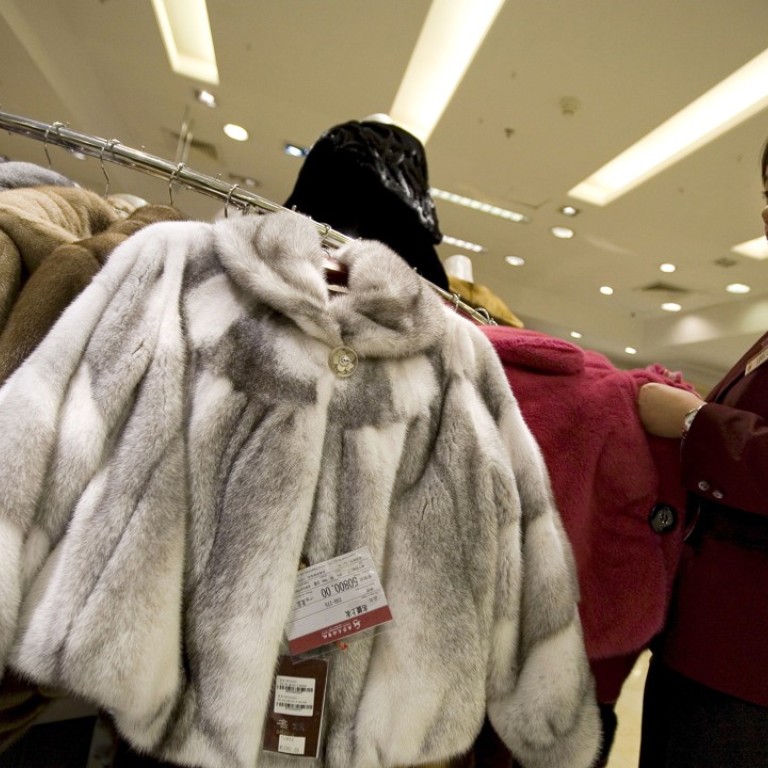
Foreign investors’ favourite Chinese stocks fall back to earth as economy slowdown bites
- Traders have been selling consumer stocks from carmakers and liquor distillers to apparel retailers since the second half of year.
- Gauges of consumer stocks, the best-performing sectors last year, are down 19 per cent in the second.
It took less than a year for Chinese consumer companies to turn from market darlings to the most dumped stocks.
Traders have been selling consumer stocks from carmakers and liquor distillers to apparel retailers since the second half of year, driving down share prices of the sector by almost 20 per cent among the worst-performing industry groups. A slowdown in China’s economic growth has started to crimp premium consumption, and the ongoing trade war with the US as well as a depreciating yuan may further cloud the industry’s outlook.
The turbulence of China’s consumer stocks underscores the trickiness of investing in the world’s largest emerging market, signalling that no sector can probably be resistant to a down cycle of the economy.
Just last year, consumer stocks often topped the daily list of most-bought stocks by overseas investors via the exchange link with Hong Kong. Global asset managers including Matthews Asia once tagged the sector as a long-term buy.
Now, signs of weakening consumer spending are everywhere. China’s annual car sales may contract for the first time in more than two decades, with Tianjin FAW Xiali Automobiles reporting a 43 per cent quarterly drop in sales for the biggest decline among all the listed carmakers. Kweichow Moutai, the world’s most valuable distiller that sells a half-litre bottle of its flagship liquor for 1,499 yuan (nearly U$220), posted its slowest profit growth in three years in the third quarter, while sales of HLA, China’s biggest retailer and maker of men’s apparels, fell unexpectedly.
“There has certainly been a shift in sentiment in consumer stocks globally all based on concerns over the Chinese demand environment,” said Douglas Morton, head of research for Asia at Northern Trust Capital Markets. “There’s been concern particularly on the luxury end of the Chinese consumption. The market has turned highly sensitive to downside risks”.
As China’s economy expanded in the third quarter at its slowest pace since the 2008 global financial crisis, consumers have started to tighten their purse strings. Spending barely picked up after growth in retail sales fell to a 15-year low of 8.5 per cent in May.
The pessimism has turned into a shakeout in the stock market. Gauges of consumer-staples and discretionary companies both slumped 19 per cent in the second half of the year. They were investors’ most beloved stocks last year, surging 81 per cent and 28 per cent respectively.
Great Wall Motor, China’s biggest maker of sports utility vehicles, has slumped 45 per cent in Shanghai this year, as third-quarter profits were down almost by half from a year ago. Its Hong Kong traded-shares have tumbled 44per cent. Shanghai-listed shares of Guangzhou Automobile Group, a partner with Toyota Motor, has sunk 36 per cent in 2018, with the Hong Kong peers sliding by the same magnitude. The weakness has been seen industry-wide, as sales of passenger vehicles dropped 12 per cent for a third straight month in September on dealership channels.
Sell-off in the consumer stocks culminated with a 10 per cent daily limit tumble in Kweichow Moutai last month. The distiller juggernaut fell by the magnitude for the first time in five years right after profit growth slowed to 2.7 per cent, the worst result over the past nine quarters.
Valuations were also a factor behind the rout. Consumer-staples companies traded at 34 times earnings last year, only 10 per cent short of its most expensive level, according to Bloomberg data. Now, the multiple dropped back to its five-year average of 22 times.
Chinese policymakers are on the move to hold up consumption as an engine that powers growth. Beijing has already raised the threshold for taxing personal incomes and is mulling over halving the tax rates on car purchases. A recent Politburo meeting convened by top leaders also dropped the reference to cracking down on the housing market, stoking speculation that the imposed restrictions on home purchases will be eased.
Still, China’s rising trade tension with the US is complicating the government’s efforts to revive consumer spending. With tariffs already imposed on Chinese goods worth US$250 billion, the White House is considering slapping duties on all remain imports, which may be US$257 billion on last year’s figures.
The trade war “impacted people’s view on the economic outlook, which made them more cautious particularly when buying cars,” said Toliver Ma, an analyst at Guotai Junan International. “Now, investors are leaving because they don’t want to stay in a low-growth industry. Auto stocks are no longer their first picks.”
Overseas luxury brands have also fallen victim to the stagnant Chinese consumer spending, as the people from the Asian nation buy almost a third of the world’s luxury goods, from Louis Vuitton handbags to Armani suits. China’s yuan has already fallen 6.1 per cent against the US dollar this year.
Hong Kong-traded shares of Prada SpA, the Italian maker of branded leather goods, have shed 31 per cent from a May high, and menswear maker Ermenegildo Zegna Group from Italy said it will be more conservative in investment in China because of the psychological impact of the trade dispute on Chinese buyers.
“Amid the expectations about slowing economic growth and the lack of the consumer confidence, consumer spending is entering a medium-term downward cycle,” said Wang Junjie, an analyst with Industrial Securities.


